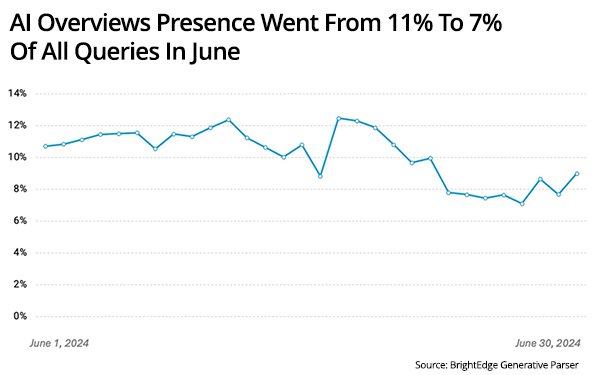
Each percentage point of search market share --
valued at $1.2 billion -- continues to shift how technology reshapes digital in unexpected ways, says Jim Yu, BrightEdge founder.
Google still dominates search. The data
generated by the BrightEdge Generative Parser (BGP) helps marketers keep informed with changes in Google Search and artificial intelligence (AI) platforms such as AI Overview.
BGP has
been tracking and monitoring AI Overviews since late last year, and it appears that overall Google has reduced the presence of AI Overviews in June, dropping from 11% to 7% of queries, according to
Yu.
Yu said the data has identified industry-specific swings, potentially offering more relevant and targeted search results.
AI Overview for
ecommerce keywords fell from 26% to 9%, for example. The significant decline in queries that are specific to ecommerce occurred in June, despite a brief increase that occurred from June 17 to
June 25, which impacted overall visibility.
advertisement
advertisement
Entertainment in June fell from 14% to nearly 0%. There was a positive correlation when users searched for golden age
Hollywood celebrities, but by the beginning of June, the AI Overviews disappeared.
Yu attributes the change to the queries that also feature knowledge graphs and universal results. In these
situations, AI Overviews did not add significant value to the user.
New AI Overview query patterns and search behavior were identified in the data, and in patterns for
certain keywords more than others.
Increases in words and phrases in AI Overviews were observed for "best," "what is," and "how to" queries, but fell for brand
comparisons and specific product searches, which . For marketers is surprising. These changes are particularly helpful in understanding the role of AI and the purchase journey of users.
The data also identified Google’s pivot from accessing user-generated platforms like Reddit and Quora to more authoritative sources, signaling a potential shift in how online content gets
consumed and valued.
Data shows referral traffic from some AI engines to websites continues to drop. OpenAI ChatGPT has "gone incognito," implementing a "no refer" tag,
which hides the engine as a referral traffic source.
"Through the tag, it hides where the traffic comes from," Yu said -- despite Google and others providing the data to
publishers.
New large language models (LLMs) such as Claude are showing up in the data as referrals.
ChatGPT, along with Claude, have moved past original
roles as conversational AI bots to becoming gateways to the web that could redefine how users interact with and navigate online information, Yu added.
BrightEdge will publish monthly a guide into AI Overviews.